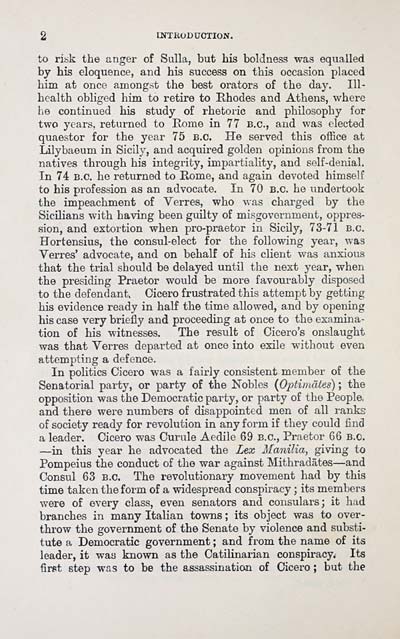Download files
Complete book:
Individual page:
Thumbnail gallery: Grid view | List view

2 LNTKODUOTION.
to risk the anger of Sulla, but his boldness was equalled
by his eloquence, and his success on this occasion placed
him at once amongst the best orators of the day. 111-
hcalth obliged him to retire to Rhodes and Athens, where
he continued his study of rhetoiic and philosophy for
two years, returned to Rome in 77 B.c, and was elected
quaestor for the year 75 B.c. He served this office at
Lilybaeum in Sicily, and acquired golden opinions from the
natives through his integrity, impartiality, and self-denial.
In 74 B.c. he returned to Rome, and again devoted himself
to his profession as an advocate. In 70 b.c. he undertook
the impeachment of Verres, who was charged by the
Sicilians with having been guUty of misgovernment, oppres-
sion, and extortion when pro-praetor in Sicily, 73-71 b.c.
Hortensius, the consul-elect for the following year, was
Verres' advocate, and on behalf of hLs client was anxious
that the trial should be delayed until the next year, when
the presiding Praetor would be more favourably disposed
to the defendant. Cicero frustrated this attempt by getting
his evidence ready in half the time allowed, and by opening
his case very briefly and proceeding at once to the examina-
tion of his witnesses. The result of Cicero's onslaught
was that Verres departed at once into exile without even
attempting a defence.
In politics Cicero was a fairly consistent member of the
Senatorial party, or party of the Nobles {Optimdtes) ; the
opposition was the Democratic party, or party of the People.
and there were numbers of disappointed men of all ranks
of society ready for revolution in any f orm if they could find
a leader. Cicero was Curule Aedile 69 b.c, Praetor 66 B.c.
— in this year he advocated the Lex Manilia, giving to
Pompeius the conduct of the war against Mithradates — and
Consul 63 B.c The revolutionary movement had by this
time taken the form of a widespread conspiracy ; its members
were of every class, even senators and consulars; it had
branches in many Italian towns ; its object was to over-
throw the government of the Senate by violence and substi-
tute a Democratic government ; and from the name of its
leader, it waa known as the Catilinarian conspiracy. Its
first step was to be the assassination of Cicero ; but the
to risk the anger of Sulla, but his boldness was equalled
by his eloquence, and his success on this occasion placed
him at once amongst the best orators of the day. 111-
hcalth obliged him to retire to Rhodes and Athens, where
he continued his study of rhetoiic and philosophy for
two years, returned to Rome in 77 B.c, and was elected
quaestor for the year 75 B.c. He served this office at
Lilybaeum in Sicily, and acquired golden opinions from the
natives through his integrity, impartiality, and self-denial.
In 74 B.c. he returned to Rome, and again devoted himself
to his profession as an advocate. In 70 b.c. he undertook
the impeachment of Verres, who was charged by the
Sicilians with having been guUty of misgovernment, oppres-
sion, and extortion when pro-praetor in Sicily, 73-71 b.c.
Hortensius, the consul-elect for the following year, was
Verres' advocate, and on behalf of hLs client was anxious
that the trial should be delayed until the next year, when
the presiding Praetor would be more favourably disposed
to the defendant. Cicero frustrated this attempt by getting
his evidence ready in half the time allowed, and by opening
his case very briefly and proceeding at once to the examina-
tion of his witnesses. The result of Cicero's onslaught
was that Verres departed at once into exile without even
attempting a defence.
In politics Cicero was a fairly consistent member of the
Senatorial party, or party of the Nobles {Optimdtes) ; the
opposition was the Democratic party, or party of the People.
and there were numbers of disappointed men of all ranks
of society ready for revolution in any f orm if they could find
a leader. Cicero was Curule Aedile 69 b.c, Praetor 66 B.c.
— in this year he advocated the Lex Manilia, giving to
Pompeius the conduct of the war against Mithradates — and
Consul 63 B.c The revolutionary movement had by this
time taken the form of a widespread conspiracy ; its members
were of every class, even senators and consulars; it had
branches in many Italian towns ; its object was to over-
throw the government of the Senate by violence and substi-
tute a Democratic government ; and from the name of its
leader, it waa known as the Catilinarian conspiracy. Its
first step was to be the assassination of Cicero ; but the
Set display mode to: Large image | Transcription
Images and transcriptions on this page, including medium image downloads, may be used under the Creative Commons Attribution 4.0 International Licence unless otherwise stated. ![]()
| Early Gaelic Book Collections > Matheson Collection > Pro S. Roscio Amerino > (10) |
|---|
| Permanent URL | https://digital.nls.uk/76502442 |
|---|
| Description | Items from a collection of 170 volumes relating to Gaelic matters. Mainly philological works in the Celtic and some non-Celtic languages. Some books extensively annotated by Angus Matheson, the first Professor of Celtic at Glasgow University. |
|---|
| Description | Selected items from five 'Special and Named Printed Collections'. Includes books in Gaelic and other Celtic languages, works about the Gaels, their languages, literature, culture and history. |
|---|

